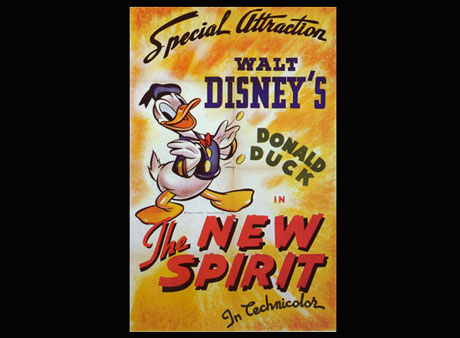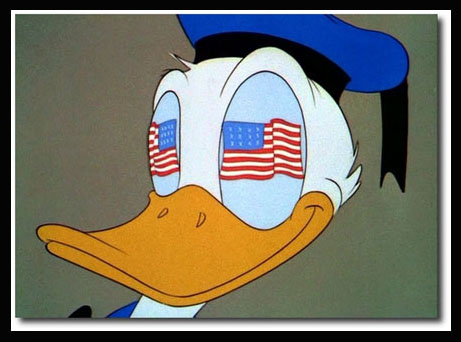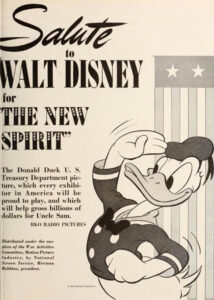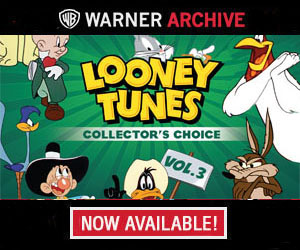
What could be a better topic for a Disney animated short than income taxes? Wait…what?!? Well, that’s precisely the focus of the 1942 Donald Duck outing The New Spirit. Eighty years after its release, watching it now is an intriguing look at how studios like Disney joined in the collective effort on the Homefront during World War II. The basis of The New Spirit was for audiences to see how paying their taxes, and doing so early, could help significantly in the War effort.

Just after the attacks on Pearl Harbor on December 7th, 1941, Walt Disney agreed to produce training films for the U.S. Military. He also met with members of the Treasury Department, who wanted to increase compliance from taxpayers. The thought was that an entertaining Disney cartoon short could communicate this effectively.
Walt enlisted Joe Grant and Dick Huemer, two of his top story artists, to create storyboards for The New Spirit, which were presented to members of the Treasury Department in a meeting in Washington, DC. Once approved, the production of the short moved forward very quickly, as the goal was to have The New Spirit in theaters in advance of the March 15th, 1942, tax payment deadline.
Directed by Wilfred Jackson and Ben Sharpsteen, The New Spirit opened on January 23rd, 1942. The short begins with the song “Yankee Doodle Spirit,” performed by Cliff (Jiminy Cricket) Edwards. We then see Donald Duck listening to his radio, on which the announcer states: “Our very shores have been attacked!” Donald talks back to the radio, “That is NOT right!”It’s a fascinating moment in Disney and animation history with such an upfront acknowledgment of war and reality being recognized in what is usually a fantasy-escapist setting. The announcer on the radio informs Donald that his country needs him to pay his taxes, in short, “Taxes to beat the Axis!”
Donald then quickly takes out all the necessary paperwork, pens, books, files, adding machine, aspirin, etc., that he will need to complete his taxes. His pen, blotter, and inkwell come to anthropomorphic life as he completes his tax form.
After he’s finished, Donald races across the country to hand-deliver his tax form to Washington, DC. The remainder of The New Spirit then shifts away from this pleasant Donald tale and is filled with impactful images, such as stacks of coins dissolving into factory smokestacks; factory whistles with Uncle Sam faces; guns and artillery shells being produced at the factory and fighter planes filling the screen in a dramatically animated battle sequence.
In this scene, the Axis is depicted as a giant, mechanical beast wearing a German helmet, who is defeated by the planes and tanks that taxes helped build. A chorus of “Let Freedom Ring” swells across the finale as silhouetted planes soar across a sky resembling the American flag.
The Treasury Department was thrilled with the final result of The New Spirit when it was released. Although, unfortunately, Congress eliminated the $80,000 appropriation that the Treasury Department had submitted to cover the cost of the film.

Despite this, the short was a hit with critics. In the Chicago Herald American, Ashton Stevens wrote, “When a movie laughs you into making out an income tax return-and borrowing money to pay it on the line -that isn’t just pecuniary propaganda, that’s magic that partakes of the miraculous.”
The audience reception to the film was strong, and The New Spirit had its intended effect. A Gallup poll at the time found that 37 percent of audiences who had seen the movie noted that it had an impact on completing their taxes on time.
Today, The New Spirit stands as a glimpse at Disney and American of another era. Author John Baxter documented the short in great detail in his book Disney During World War II: How The Walt Disney Studio Contributed to Victory in the War.
In it, Baxter notes that with The New Spirit, “…Walt successfully portrayed the act of paying one’s taxes as an act of patriotism, which was exactly what the Treasury Department had bargained for when they hired him.”
- An Eye for A Classic: The 60th Anniversary of “Mr. Magoo’s Christmas Carol” - December 22, 2022
- A Very Merry Mickey: The 70th Anniversary of “Pluto’s Christmas Tree” - December 19, 2022
- A Fine French Feline Film: The 60th Anniversary of “Gay Pur-ee” - December 12, 2022


 January 28th, 2022
January 28th, 2022  Michael Lyons
Michael Lyons 
 Posted in
Posted in  Tags:
Tags: 






